Business Law Case Study: Sidney & Nancy - Compact Business Systems
VerifiedAdded on 2022/09/16
|6
|1323
|11
Case Study
AI Summary
This case study analyzes the legal issues arising from the establishment of Compact Business Systems by Sidney and Nancy, former employees of National Business Systems. The analysis addresses several key areas of business law, including passing off due to the similar name and logo to Compaq Business Systems, interference with contractual relations through the solicitation of National's customers, and potential defamation claims related to their business practices. Furthermore, the assignment examines the enforceability of restrictive covenants, the issue of trespass involving a leasing company's agent, and the negligence of Nancy leading to an injury. The case study also delves into potential violations of the bankruptcy code and the negligence of Compact leading to the theft of a customer's computer. Each issue is analyzed with relevant legal principles and potential remedies. The assignment provides a comprehensive overview of the legal challenges faced by Compact Business Systems and the potential liabilities of its founders.
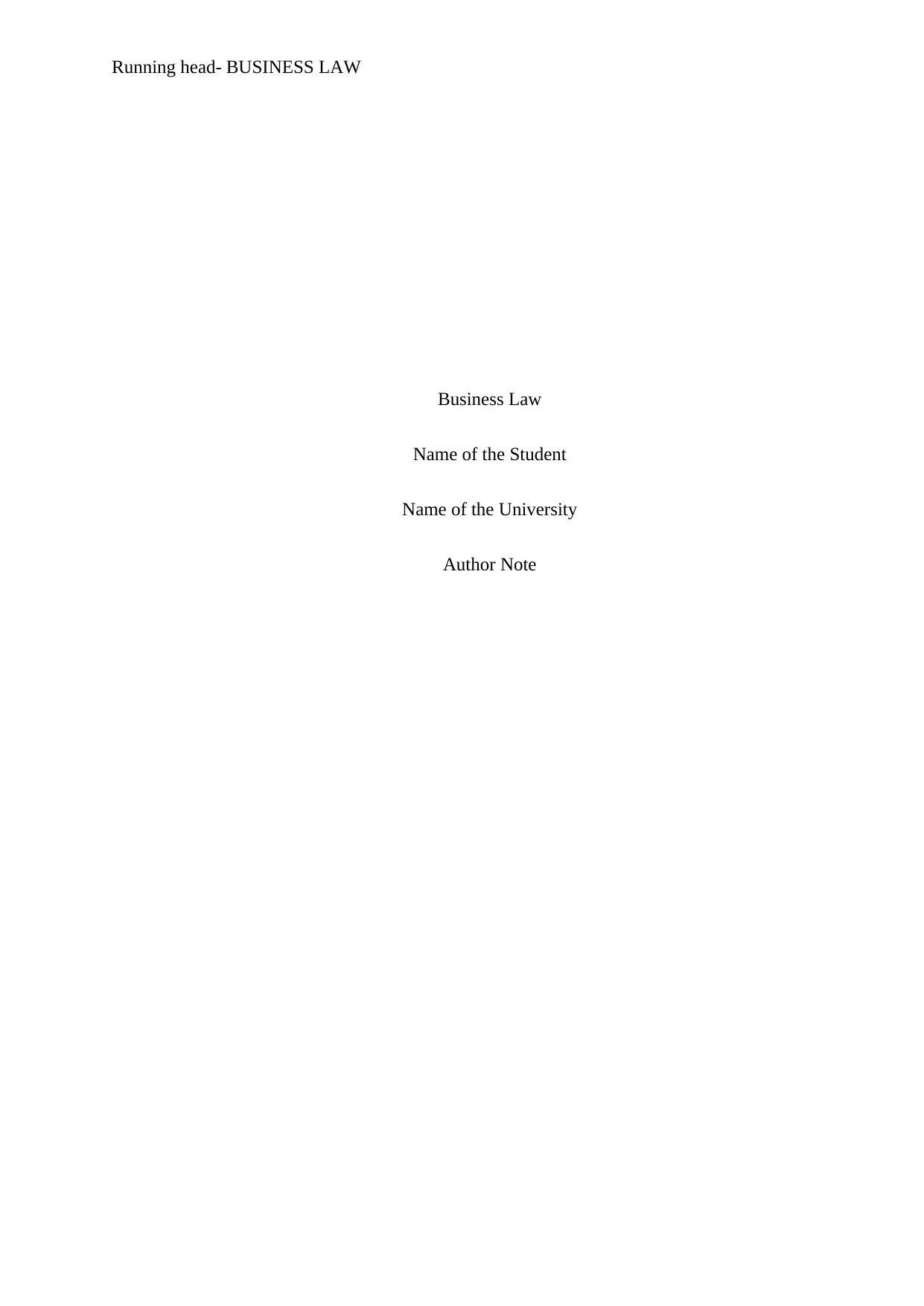
Running head- BUSINESS LAW
Business Law
Name of the Student
Name of the University
Author Note
Business Law
Name of the Student
Name of the University
Author Note
Paraphrase This Document
Need a fresh take? Get an instant paraphrase of this document with our AI Paraphraser
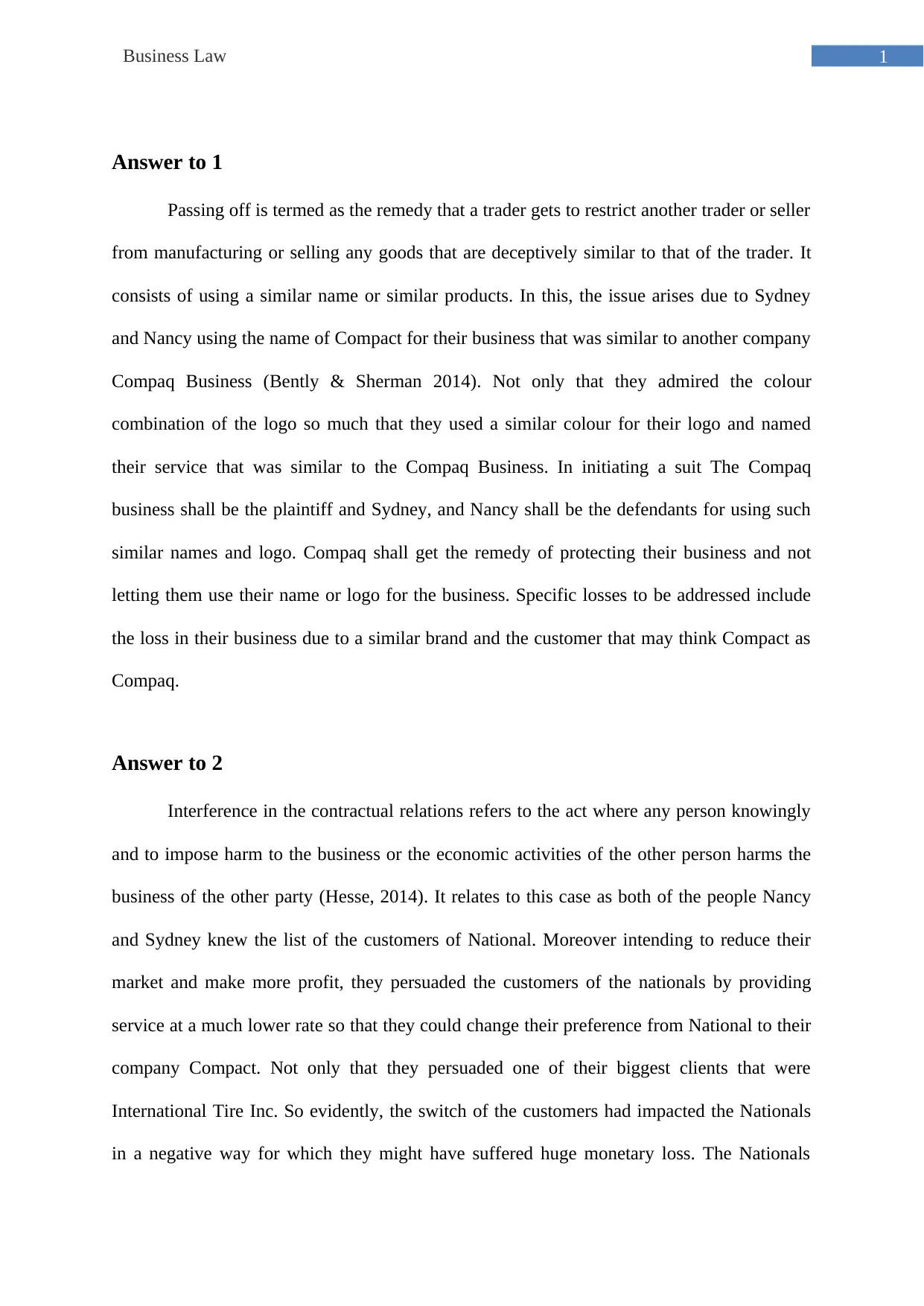
1Business Law
Answer to 1
Passing off is termed as the remedy that a trader gets to restrict another trader or seller
from manufacturing or selling any goods that are deceptively similar to that of the trader. It
consists of using a similar name or similar products. In this, the issue arises due to Sydney
and Nancy using the name of Compact for their business that was similar to another company
Compaq Business (Bently & Sherman 2014). Not only that they admired the colour
combination of the logo so much that they used a similar colour for their logo and named
their service that was similar to the Compaq Business. In initiating a suit The Compaq
business shall be the plaintiff and Sydney, and Nancy shall be the defendants for using such
similar names and logo. Compaq shall get the remedy of protecting their business and not
letting them use their name or logo for the business. Specific losses to be addressed include
the loss in their business due to a similar brand and the customer that may think Compact as
Compaq.
Answer to 2
Interference in the contractual relations refers to the act where any person knowingly
and to impose harm to the business or the economic activities of the other person harms the
business of the other party (Hesse, 2014). It relates to this case as both of the people Nancy
and Sydney knew the list of the customers of National. Moreover intending to reduce their
market and make more profit, they persuaded the customers of the nationals by providing
service at a much lower rate so that they could change their preference from National to their
company Compact. Not only that they persuaded one of their biggest clients that were
International Tire Inc. So evidently, the switch of the customers had impacted the Nationals
in a negative way for which they might have suffered huge monetary loss. The Nationals
Answer to 1
Passing off is termed as the remedy that a trader gets to restrict another trader or seller
from manufacturing or selling any goods that are deceptively similar to that of the trader. It
consists of using a similar name or similar products. In this, the issue arises due to Sydney
and Nancy using the name of Compact for their business that was similar to another company
Compaq Business (Bently & Sherman 2014). Not only that they admired the colour
combination of the logo so much that they used a similar colour for their logo and named
their service that was similar to the Compaq Business. In initiating a suit The Compaq
business shall be the plaintiff and Sydney, and Nancy shall be the defendants for using such
similar names and logo. Compaq shall get the remedy of protecting their business and not
letting them use their name or logo for the business. Specific losses to be addressed include
the loss in their business due to a similar brand and the customer that may think Compact as
Compaq.
Answer to 2
Interference in the contractual relations refers to the act where any person knowingly
and to impose harm to the business or the economic activities of the other person harms the
business of the other party (Hesse, 2014). It relates to this case as both of the people Nancy
and Sydney knew the list of the customers of National. Moreover intending to reduce their
market and make more profit, they persuaded the customers of the nationals by providing
service at a much lower rate so that they could change their preference from National to their
company Compact. Not only that they persuaded one of their biggest clients that were
International Tire Inc. So evidently, the switch of the customers had impacted the Nationals
in a negative way for which they might have suffered huge monetary loss. The Nationals
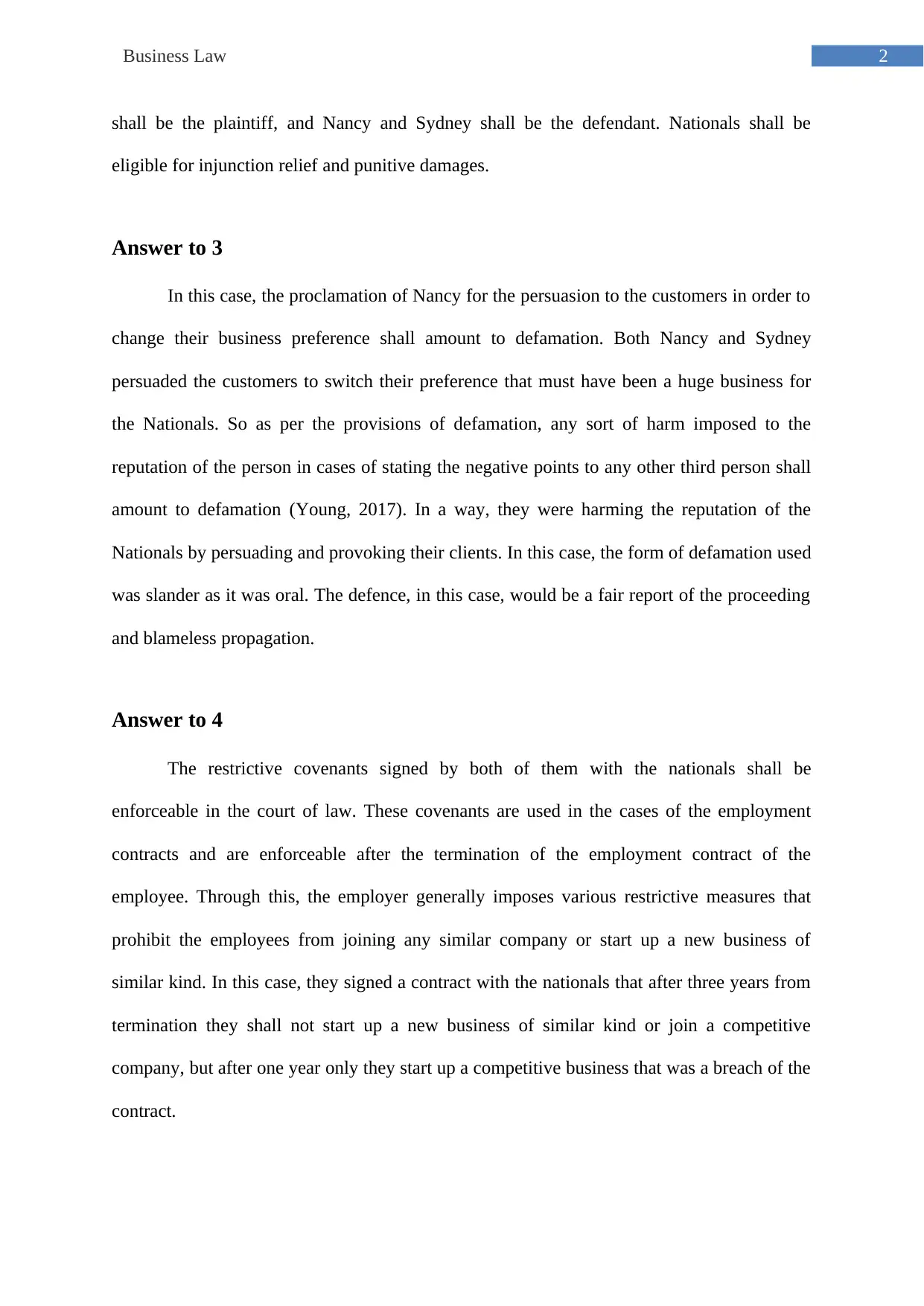
2Business Law
shall be the plaintiff, and Nancy and Sydney shall be the defendant. Nationals shall be
eligible for injunction relief and punitive damages.
Answer to 3
In this case, the proclamation of Nancy for the persuasion to the customers in order to
change their business preference shall amount to defamation. Both Nancy and Sydney
persuaded the customers to switch their preference that must have been a huge business for
the Nationals. So as per the provisions of defamation, any sort of harm imposed to the
reputation of the person in cases of stating the negative points to any other third person shall
amount to defamation (Young, 2017). In a way, they were harming the reputation of the
Nationals by persuading and provoking their clients. In this case, the form of defamation used
was slander as it was oral. The defence, in this case, would be a fair report of the proceeding
and blameless propagation.
Answer to 4
The restrictive covenants signed by both of them with the nationals shall be
enforceable in the court of law. These covenants are used in the cases of the employment
contracts and are enforceable after the termination of the employment contract of the
employee. Through this, the employer generally imposes various restrictive measures that
prohibit the employees from joining any similar company or start up a new business of
similar kind. In this case, they signed a contract with the nationals that after three years from
termination they shall not start up a new business of similar kind or join a competitive
company, but after one year only they start up a competitive business that was a breach of the
contract.
shall be the plaintiff, and Nancy and Sydney shall be the defendant. Nationals shall be
eligible for injunction relief and punitive damages.
Answer to 3
In this case, the proclamation of Nancy for the persuasion to the customers in order to
change their business preference shall amount to defamation. Both Nancy and Sydney
persuaded the customers to switch their preference that must have been a huge business for
the Nationals. So as per the provisions of defamation, any sort of harm imposed to the
reputation of the person in cases of stating the negative points to any other third person shall
amount to defamation (Young, 2017). In a way, they were harming the reputation of the
Nationals by persuading and provoking their clients. In this case, the form of defamation used
was slander as it was oral. The defence, in this case, would be a fair report of the proceeding
and blameless propagation.
Answer to 4
The restrictive covenants signed by both of them with the nationals shall be
enforceable in the court of law. These covenants are used in the cases of the employment
contracts and are enforceable after the termination of the employment contract of the
employee. Through this, the employer generally imposes various restrictive measures that
prohibit the employees from joining any similar company or start up a new business of
similar kind. In this case, they signed a contract with the nationals that after three years from
termination they shall not start up a new business of similar kind or join a competitive
company, but after one year only they start up a competitive business that was a breach of the
contract.
⊘ This is a preview!⊘
Do you want full access?
Subscribe today to unlock all pages.

Trusted by 1+ million students worldwide
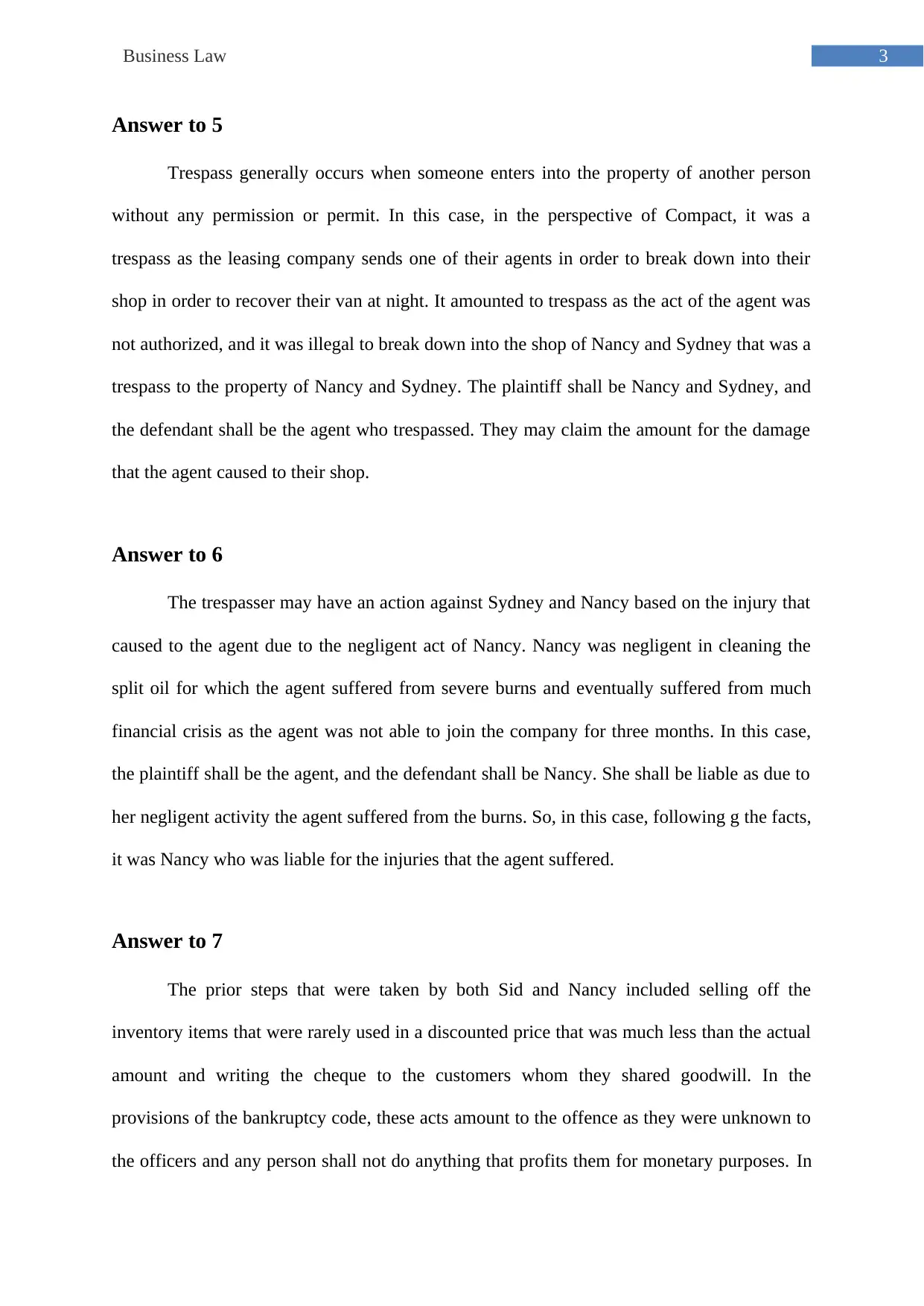
3Business Law
Answer to 5
Trespass generally occurs when someone enters into the property of another person
without any permission or permit. In this case, in the perspective of Compact, it was a
trespass as the leasing company sends one of their agents in order to break down into their
shop in order to recover their van at night. It amounted to trespass as the act of the agent was
not authorized, and it was illegal to break down into the shop of Nancy and Sydney that was a
trespass to the property of Nancy and Sydney. The plaintiff shall be Nancy and Sydney, and
the defendant shall be the agent who trespassed. They may claim the amount for the damage
that the agent caused to their shop.
Answer to 6
The trespasser may have an action against Sydney and Nancy based on the injury that
caused to the agent due to the negligent act of Nancy. Nancy was negligent in cleaning the
split oil for which the agent suffered from severe burns and eventually suffered from much
financial crisis as the agent was not able to join the company for three months. In this case,
the plaintiff shall be the agent, and the defendant shall be Nancy. She shall be liable as due to
her negligent activity the agent suffered from the burns. So, in this case, following g the facts,
it was Nancy who was liable for the injuries that the agent suffered.
Answer to 7
The prior steps that were taken by both Sid and Nancy included selling off the
inventory items that were rarely used in a discounted price that was much less than the actual
amount and writing the cheque to the customers whom they shared goodwill. In the
provisions of the bankruptcy code, these acts amount to the offence as they were unknown to
the officers and any person shall not do anything that profits them for monetary purposes. In
Answer to 5
Trespass generally occurs when someone enters into the property of another person
without any permission or permit. In this case, in the perspective of Compact, it was a
trespass as the leasing company sends one of their agents in order to break down into their
shop in order to recover their van at night. It amounted to trespass as the act of the agent was
not authorized, and it was illegal to break down into the shop of Nancy and Sydney that was a
trespass to the property of Nancy and Sydney. The plaintiff shall be Nancy and Sydney, and
the defendant shall be the agent who trespassed. They may claim the amount for the damage
that the agent caused to their shop.
Answer to 6
The trespasser may have an action against Sydney and Nancy based on the injury that
caused to the agent due to the negligent act of Nancy. Nancy was negligent in cleaning the
split oil for which the agent suffered from severe burns and eventually suffered from much
financial crisis as the agent was not able to join the company for three months. In this case,
the plaintiff shall be the agent, and the defendant shall be Nancy. She shall be liable as due to
her negligent activity the agent suffered from the burns. So, in this case, following g the facts,
it was Nancy who was liable for the injuries that the agent suffered.
Answer to 7
The prior steps that were taken by both Sid and Nancy included selling off the
inventory items that were rarely used in a discounted price that was much less than the actual
amount and writing the cheque to the customers whom they shared goodwill. In the
provisions of the bankruptcy code, these acts amount to the offence as they were unknown to
the officers and any person shall not do anything that profits them for monetary purposes. In
Paraphrase This Document
Need a fresh take? Get an instant paraphrase of this document with our AI Paraphraser
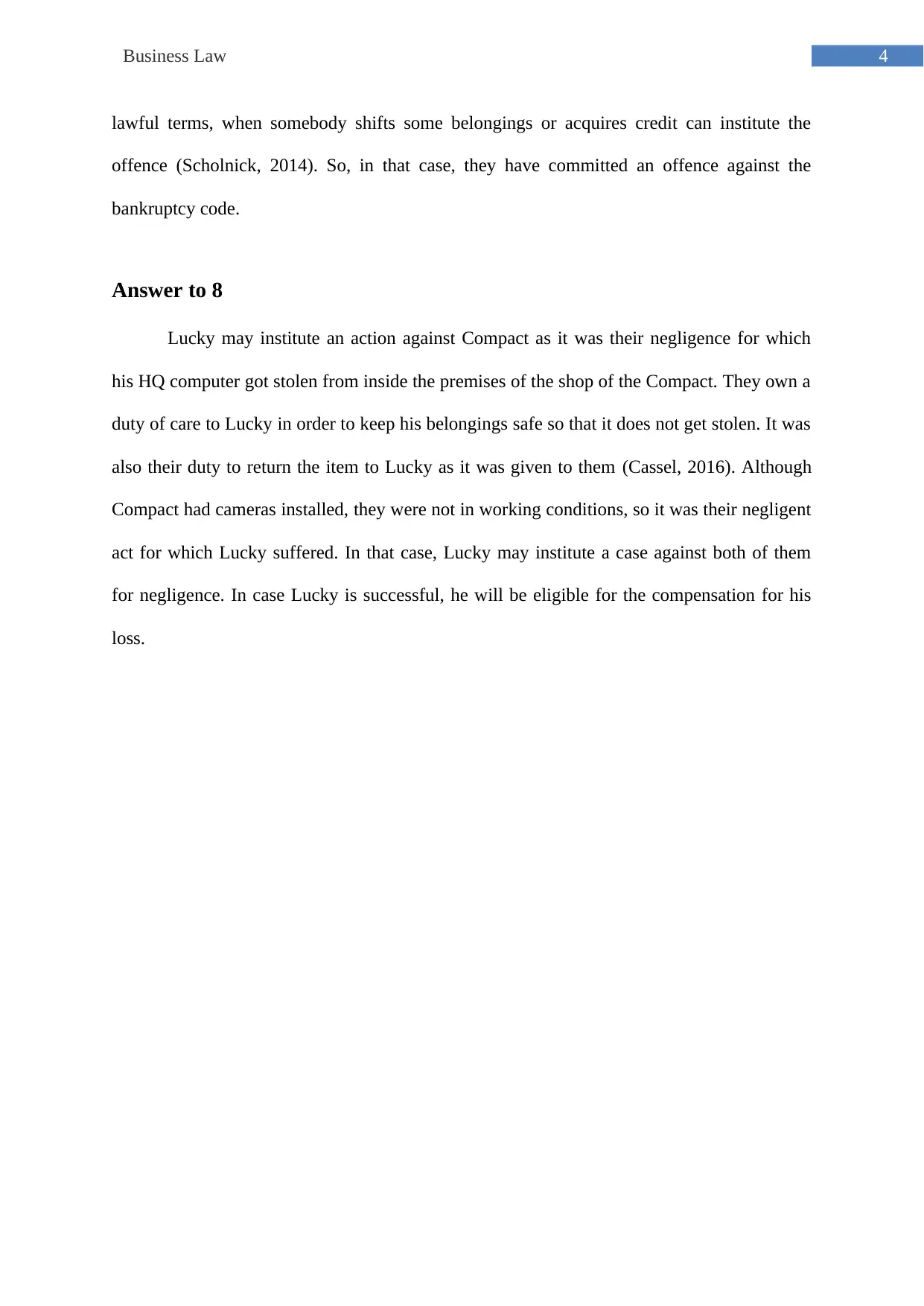
4Business Law
lawful terms, when somebody shifts some belongings or acquires credit can institute the
offence (Scholnick, 2014). So, in that case, they have committed an offence against the
bankruptcy code.
Answer to 8
Lucky may institute an action against Compact as it was their negligence for which
his HQ computer got stolen from inside the premises of the shop of the Compact. They own a
duty of care to Lucky in order to keep his belongings safe so that it does not get stolen. It was
also their duty to return the item to Lucky as it was given to them (Cassel, 2016). Although
Compact had cameras installed, they were not in working conditions, so it was their negligent
act for which Lucky suffered. In that case, Lucky may institute a case against both of them
for negligence. In case Lucky is successful, he will be eligible for the compensation for his
loss.
lawful terms, when somebody shifts some belongings or acquires credit can institute the
offence (Scholnick, 2014). So, in that case, they have committed an offence against the
bankruptcy code.
Answer to 8
Lucky may institute an action against Compact as it was their negligence for which
his HQ computer got stolen from inside the premises of the shop of the Compact. They own a
duty of care to Lucky in order to keep his belongings safe so that it does not get stolen. It was
also their duty to return the item to Lucky as it was given to them (Cassel, 2016). Although
Compact had cameras installed, they were not in working conditions, so it was their negligent
act for which Lucky suffered. In that case, Lucky may institute a case against both of them
for negligence. In case Lucky is successful, he will be eligible for the compensation for his
loss.
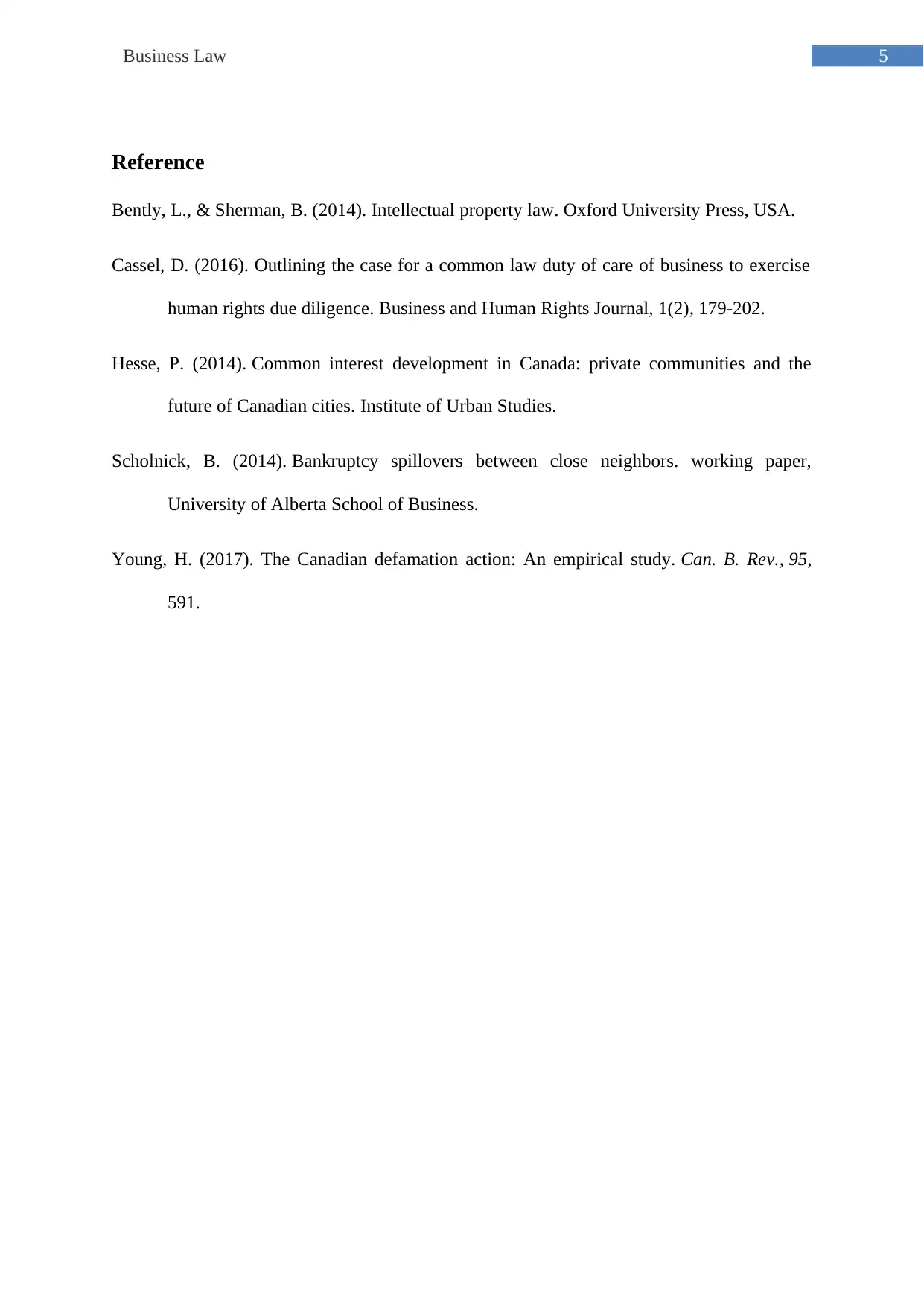
5Business Law
Reference
Bently, L., & Sherman, B. (2014). Intellectual property law. Oxford University Press, USA.
Cassel, D. (2016). Outlining the case for a common law duty of care of business to exercise
human rights due diligence. Business and Human Rights Journal, 1(2), 179-202.
Hesse, P. (2014). Common interest development in Canada: private communities and the
future of Canadian cities. Institute of Urban Studies.
Scholnick, B. (2014). Bankruptcy spillovers between close neighbors. working paper,
University of Alberta School of Business.
Young, H. (2017). The Canadian defamation action: An empirical study. Can. B. Rev., 95,
591.
Reference
Bently, L., & Sherman, B. (2014). Intellectual property law. Oxford University Press, USA.
Cassel, D. (2016). Outlining the case for a common law duty of care of business to exercise
human rights due diligence. Business and Human Rights Journal, 1(2), 179-202.
Hesse, P. (2014). Common interest development in Canada: private communities and the
future of Canadian cities. Institute of Urban Studies.
Scholnick, B. (2014). Bankruptcy spillovers between close neighbors. working paper,
University of Alberta School of Business.
Young, H. (2017). The Canadian defamation action: An empirical study. Can. B. Rev., 95,
591.
⊘ This is a preview!⊘
Do you want full access?
Subscribe today to unlock all pages.

Trusted by 1+ million students worldwide
1 out of 6
Your All-in-One AI-Powered Toolkit for Academic Success.
+13062052269
info@desklib.com
Available 24*7 on WhatsApp / Email
![[object Object]](/_next/static/media/star-bottom.7253800d.svg)
Unlock your academic potential
Copyright © 2020–2026 A2Z Services. All Rights Reserved. Developed and managed by ZUCOL.


